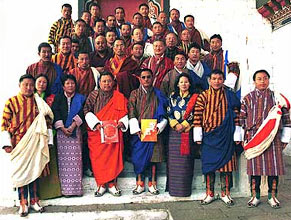|
Bhutan's
new Constitution
|
 |
Bhutan Politics |
|
 |
Bhutan Information |
|
|
|
| First
draft of the Constitution submitted to His Majesty
|
 |
December
2002
 |
| The members of the drafting committee |
| The
first draft of the Constitution of the Kingdom of Bhutan was formally submitted
to His Majesty the King by the constitution drafting committee in an auspicious
ceremony in the Throne Room of Tashichhodzong on December 9, the fifth
day of the 11th Bhutanese month. The chairman of the constitution drafting
committee, Chief Justice Lyonpo Sonam Tobgye, said that the committee,
representing the monastic community, the people, and government, had drawn
deeply from the profound wisdom and foresight and the wise counsel they
had received from His Majesty the King who commanded the drafting of the
Constitution one year ago. |
|
"We
were inspired by His Majesty's personal initiatives to ensure that our
nation continues to enjoy a dynamic and popular political system which
involves all the people in the governance of the nation," said the chief
justice. "We share His Majesty's vision of a nation which enjoys economic
prosperity, intellectual capacity, spiritual health, domestic tranquillity,
and justice to ensure the happiness and well being of the people for all
time."
The
committee completed the first draft of the Constitution after extensive
discussions over six special sittings.
top
|
First
draft of the Constitution completed
|

|
December
2002
Lyonpo
Sonam Tobgye said the draft Constitution had evolved through intense deliberations
on the principles of state policies, rights and duties of citizens, religious
pluralism and the state monastic community, separation of powers of the
main organs of state, the concept of democratic government based on party
systems, political neutrality of the civil service, autonomy of the constitutional
offices, local governance and decentralisation, the structure of government,
power and authority of the state apparatus.
He
added that the committee, which had conducted its discussions with complete
autonomy, was proud of the draft which was drawn largely from the Bhutanese
experience as well as from a study of numerous existing Constitutions.
"While it was a daunting realisation that the religious and cultural heritage
of the country, the security and sovereignty of the kingdom, and the well
being of the people would depend on the institutions, provisions, and procedures
established by the Constitution we drew our strength from His Majesty's
trust and confidence in us," said Lyonpo Sonam Tobgye.
The
committee also submitted to His Majesty the King a proposal to establish
new institutions and legislation to maintain the "neutrality of the constitutional
bodies and those who work in them". These would include an election commission
and election act, the reformation of the royal civil service commission
and appointment of new members, enactment of the judiciary act and legislative
service act to delineate the powers of the judiciary and legislature from
the executive, and establishment of various other constitutional bodies
and legislation to create the right professional environment for the Constitution.
The members of the committee also submitted that they sought the wisdom
of His Majesty the King to further refine the Constitution. As a fundamental
law for the kingdom, the draft would need to be strengthened with the profound
vision of His Majesty the King.
The
speaker of the National Assembly, Dasho Ugyen Dorji, said that the people
were genuinely concerned about the impact of change which was to be ushered
in at a time when the nation was enjoying unprecedented peace and stability.
For example, the recent election of gups had revealed several negative
trends which could grow as a result of vested interests and numerous forms
of corruption and political wrangling. It was important, therefore, that
the Constitution provided safeguards, including the proposed new institutions
and systems, against some of these debilitating problems.
The
chairman of the royal advisory council, Dasho Rinzin Gyeltshen, said that
the people were concerned about how the Constitution would affect the Monarchy
and they were also disturbed by the idea of political parties, believing
that party politics would be unhealthy for a small country like Bhutan.
The
National Assembly secretary, Dasho Tashi Phuntshog, said that, judging
by the experiences of other countries, a Constitution alone did not ensure
unity which was the ultimate criteria for peace and stability in the kingdom.
Bhutan's Constitution must, therefore, draw from Bhutan's own experience.
For example, an indisputable element of Bhutanese history was that the
kingdom had enjoyed peace and prosperity because of the establishment of
hereditary Monarchy. It was critical that the Bhutanese Monarch, the symbol
of unity of the Bhutanese system, continued to play an important role within
the Constitution.
"His
Majesty the King must fill in the voids where the Constitution is silent,"
said the Wangduephodrang chimi. Formally accepting the first draft of the
Constitution, His Majesty the King noted that the draft had been drawn
up by the committee completely independent of all influences. His Majesty
said that he had deliberately avoided any involvement in the drafting process
as the Constitution would have to be finalised jointly by the government,
the people, and His Majesty the King. During the discussions after the
formal presentation ceremony, His Majesty the King asked the committee
members to share their honest views on all matters related to the Constitution
and its contents..
| This
article was contributed by Kuensel, Bhutan's National Newspaper, 2002 |
 |
| Links |
 |
 |
 |
External
links |
|



